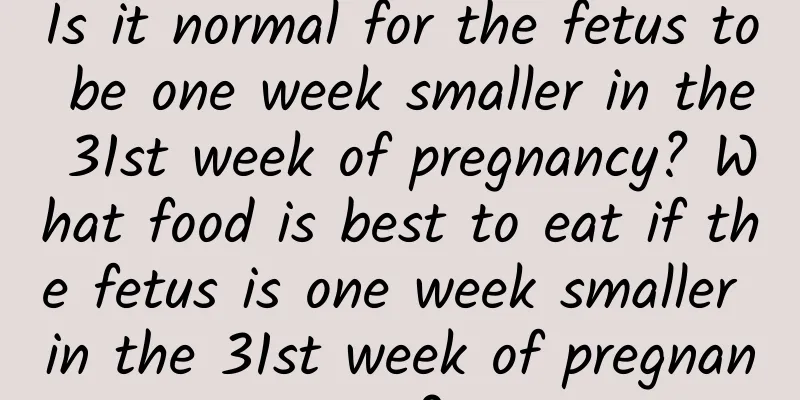Is it normal for the fetus to be one week smaller in the 31st week of pregnancy? What food is best to eat if the fetus is one week smaller in the 31st week of pregnancy?

|
We all know that after a woman becomes pregnant, the fetus will continue to grow and develop in the mother's belly. Due to the different physical conditions of each mother, some fetuses develop normally, some develop faster, and some develop slower, etc. So is it normal for the fetus to be one week smaller at 31 weeks of pregnancy? Let's take a closer look! Is it normal for the fetus to be one week smaller at 31 weeks of pregnancy?It is normal for the fetus to be one week smaller after 30 weeks of pregnancy. Therefore, pregnant mothers do not need to deliberately supplement nutrition. As long as the fetal movement is normal and the pregnant woman has no obvious discomfort, then she just needs to wait for the baby to be born at full term. Before 30 weeks of pregnancy, if the fetus is 1 to 2 weeks smaller, it is usually related to malnutrition of the pregnant woman. After 30 weeks of pregnancy, if the fetus is smaller than 2 weeks, it is generally within the normal range. Because the fetus grows rapidly in the late stages of pregnancy (enters the fetal growth spurt after 28 weeks) and is greatly affected by the parents' genetics and placental function, 2 standard deviations are allowed when doing prenatal B-ultrasound after 30 weeks of pregnancy. Why is the fetus one week smaller at 31 weeks of pregnancy?1. MalnutritionIf you are picky about food and lack appetite during pregnancy, the fetus will not get enough nutrients and will grow smaller. The seven major nutrients during pregnancy mainly include: protein, fat, carbohydrates and water, as well as vitamins, minerals and dietary fiber. All of these nutrients are indispensable. Pregnant women need to supplement high-quality protein, including meat, eggs, milk and fish; fat can be supplemented with more n-3 and n-6 "essential fatty acids" such as fish and walnuts; carbohydrates are mainly staple foods, of which whole grains should account for 1/3; minerals, dietary fiber and vitamins are mainly included in vegetables and meat. As long as the pregnant woman is not obviously picky about food, the fetus will usually not grow small. 2. Improper dietSome pregnant women like to drink cola, coffee, tea, various functional drinks and chocolate. These foods contain high levels of caffeine, which can increase fetal movement. This significantly increases the probability of low birth weight. Some pregnant women prefer to eat sweets, such as cream cakes or chocolate cakes. These foods contain more trans fatty acids, and too much sugar and esters are not absorbed and utilized, which can only provide calories but not nutrition. If they often do this, it is easy to cause the fetus to grow smaller. 3. Wrong calculation of gestational age or B-ultrasound measurement errorThe small size of the fetus may also be related to the miscalculation of the gestational age. Pregnant mothers can find the B-ultrasound data around 7 weeks of early pregnancy to recheck. Or ask the obstetrician to check the gestational age. Another reason is that there are some errors in the B-ultrasound in the late pregnancy, which has been mentioned above and will not be repeated. 4. Genetics from parentsIn the early stages of pregnancy, the growth and development of the fetus is relatively standard, because the growth process of the fetus from a fertilized egg to an embryo has certain rules, and the deviation from the median is very small. Then in the late stages of pregnancy, the growth and development of the fetus accelerates significantly, and at this time it is more affected by the genetics of the parents. If both parents are thin and light, then the fetus will usually grow a little smaller. This is all normal. 31 weeks of pregnancy, the fetus is small, what should I eat for one week1. Foods that are better for growing a babyFoods that are generally believed to be particularly effective in promoting pregnancy include: milk powder for pregnant women, sweet potatoes, and durian. People with poor stomachs should eat less sweet potatoes, and those with high blood sugar levels should not eat durian. Milk powder for pregnant women can be taken 1-2 times a day. Milk powder for pregnant women can supplement many nutritional needs of pregnant women, so after pregnancy, pregnant women can consume milk powder appropriately. Pregnant women are prone to hunger, so they can eat some nuts between meals to fill their stomachs. Nuts also contain DHA nutrients that the fetus needs, and proper consumption can promote the baby's brain development. Therefore, you can prepare some walnuts, pistachios, etc. Fruits and vegetables are rich in vitamins, so pregnant women should not only eat meat to supplement their nutrition, but also pay attention to a balanced diet and eat some fruits and vegetables. There are many choices of fruits, such as grapefruit, cherries, grapes, and apples. Eat all kinds of vegetables, mainly green leafy vegetables. 2. Foods rich in high-quality proteinIf you want to grow a baby, protein is essential. There are many foods rich in protein, such as milk, eggs, various lean meats, etc. Among them, beef is a very good choice. It is nutritious, rich in high-quality protein, and has relatively low calories and fat content. It can also nourish the spleen and stomach, replenish qi and blood, and strengthen muscles and bones. It is a very good food choice during pregnancy. 3. Carbohydrate-Rich FoodsIf you want to grow the fetus, you must increase your carbohydrate intake. It is not only good for the growth of the fetus but also beneficial to the brain development of the fetus. There are many foods rich in carbohydrates, such as rice, brown rice, corn, oats, biscuits, etc. What to eat during pregnancy to supplement the necessary nutrientsSupplement protein: such as soybeans, chicken, duck, lean pork, beef, eggs, milk is recommended, at least 250~500g of dairy products per day, and deep-sea fish 2 to 3 times a week. Iron supplement: Long-term anemia has a certain impact on fetal development. You can supplement 20-50g of red meat daily and eat animal offal or blood 1-2 times a week. Iodine supplement: You can choose to eat iodine-rich seafood such as kelp and seaweed 1 to 2 times a week. Supplementary grain foods: You can eat about 300g of whole wheat flour. Folic acid supplement: You can supplement an additional 400~800ug of folic acid daily. |
Recommend
Causes and treatments for cold hands and feet in women in summer
The weather is hot in summer. However, some women...
Why do women have acne on their chins?
Acne can appear on any part of the body, and any ...
Healthy Life from Oil | Will unreasonable intake of edible oil have an impact on our health?
Among the many food elements, oil has the greates...
Don't be a "three-minute heat" anymore. Is it really difficult to stick to fitness? No, you just haven't found the right method.
Is it difficult to stick to fitness? I think thos...
Can I eat bayberry during menstruation?
It can refer to the duration of a woman's men...
The reason why girls' private parts are dark
Some girls' private parts are lighter in tone...
Can I detect pregnancy in one month?
There are no obvious changes in a woman's bod...
Why do I feel a little dizzy during my period?
Menstruation, which comes once a month, really br...
Which material of radiator is suitable for home use? How to choose radiator?
Radiators are a common way to keep warm in the no...
What can be found in gynecological examination of leucorrhea
During a gynecological examination, B-ultrasound ...
What causes headache on the right side of a woman
When we have a headache, we will find that not th...
What to do if a woman's hands and feet become weak
There are many reasons for women's weak hands...
Can I have sex when I am 8 months pregnant?
There are many taboos during pregnancy. For examp...
Why do people age? It's related to telomeres
Today we will talk about why people age. From a m...
What should I do if my period leaks during school?
The first time a girl gets her period is very fri...









